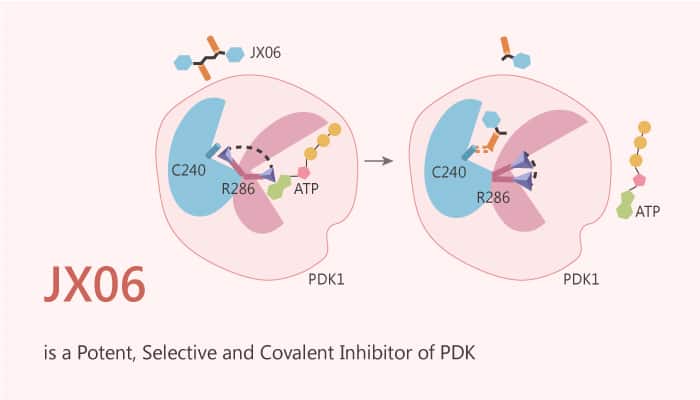Pyruvate dehydrogenase kinase (PDK) is a kinase that can be inactivated by the use of ATP phosphorylation of pyruvate dehydrogenase. Specifically, PDK is relevant to the regulation of the pyruvate dehydrogenase complex with pyruvate dehydrogenase as the first component. Besides, PDK acts as a molecular switch to reduce mitochondrial respiration and enhance aerobic glycolysis by phosphorylating and inactivating the gated mitochondrial pyruvate dehydrogenase (PDH). Moreover, PDH catalyzes the oxidative decarboxylation of pyruvate to acetyl CoA. And acetyl CoA is the only entrance to introduce pyruvate into the mitochondrial tricarboxylic acid cycle. Furthermore, PDK in the PDH complex (PDC) phosphorylates PDH and limits glycolysis products from entering mitochondrial respiration. PDK1 is also regulated by cancer-driving factors at the post-translation level. A carcinogenic protein can reshape the metabolic network by regulating PDK1 at multiple levels. JX06 is a potent, selective, and covalent inhibitor of PDK.
and covalent inhibitor of PDK.
JX06 is a potent, selective and covalent inhibitor of PDK with anti-cancer activity.
But, how does JX06 protect against cancer cells via PDK? Let’s discuss it in detail. In the beginning, JX06 is a potent, selective and covalent inhibitor of PDK. Meanwhile, JX06 inhibits PDK1, PDK2 and PDK3 with the IC50s of 49 nM, 101 nM, and 313 nM, respectively. Based on the recognition of hydrophobic pocket near the ATP pocket of the PDK1 enzyme, JX06 forms a disulfide bond with thiol group of conservative cysteine residue (C240). Nonetheless, JX06 inhibits PDK1 activity via covalently binding to a cysteine residue in an irreversible manner.
In the second place, JX06 barely shows inhibitory activity against PDK4 at a concentration of 10 μM. Particularly, JX06 induces cell apoptosis in cancer cells with high ECAR/OCR and dose-dependently suppresses the growth of A549 cells. JX06 inhibits PDHA1 phosphorylation in A549 cells in a time- and dose-dependent manner. Importantly, JX06 increases glucose uptake and intracellular ATP level and reduces aerobic glycolysis determined by the lactate production in A549 cells. Interestingly, JX06 induces ROS generation in cancer cells with a high extracellular acidification rate (ECAR)/ oxygen consumption rate (OCR).
Last but not the least, JX06 reduced tumor weights and 67.5% tumor volume compared with the vehicle control. Consistent with the significant antitumor effect of JX06, JX06 significantly inhibited PDK1 signal transduction in the tumor. By the way, the blocking of PDHA1 phosphorylation and the decrease of plasma lactic acid levels in JX06 treated mice is evidence.
All in all, JX06 is a potent, selective and covalent inhibitor of PDK with anti-cancer activity.
References:
Wenyi S, et, al. Cancer Res. 2015 Nov 15; 75(22): 4923-36.